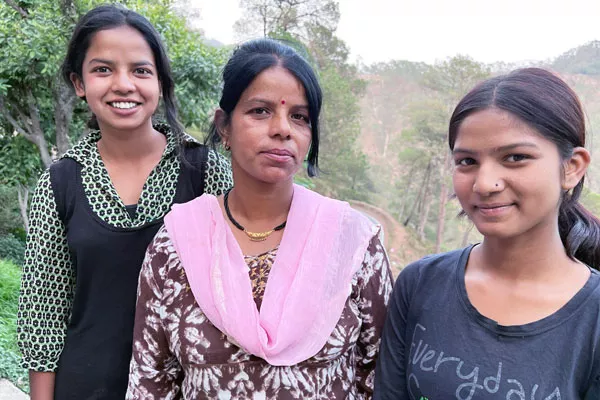A mother in India breaks the cycle of violence and abuse

Manju and her daughters in Bhumiadar, India.
At 37, Manju is the head of her family. Mother to two teenage daughters and a 5-year-old son, Manju recently took the final step to separate from her husband after suffering dehumanizing violence and abuse for more than two decades in her marriage. She decided not to let her children suffer anymore. She promised herself not to go back to her husband, no matter how much pressure the community put on her.
She is the only woman-headed household in the village, one of the few women with a bank account, and is financially independent.
The mountain village of Bhumiadar, where Manju’s family lives, mainly consists of manual labourers/contractors who work at the local fruit market. While most of the children in the village have a primary education, most adults above the age of 25 have not been to school. Most women in the village have never owned property or had an income. Domestic violence and intimate partner violence are an everyday reality for most women in the village.
“My husband would come back home drunk every night and abuse me and the girls. He would not allow me to get out of the house, always suspecting that I was having an affair with someone. He would hit me in front of the girls. I also found out later that he had abused the girls in my absence. It was when my daughters grew up and became scared of being around him that I realized that we could not continue in this hell. That is when I started asking for help from people to show us a way out,” says Manju, tearing up, still recovering from her trauma.
Sita is a neighbour who gave refuge to the family many times. “We would get desperate calls from Manju late at night to come and rescue her and her daughters after her husband had come home drunk. This became such an explosive situation that we started hiding them in our house and jungle sometimes. He was not at all like a husband or a father to this family. They felt safer in the jungle around animals or with strangers than near him. We were at our wit’s end at what we could do for this family.”
While Manju struggled to keep her children safe, someone recommended that she join the SOS Children’s Villages Family Strengthening Program. In 2019, she started getting support for her daughters’ education and received a livelihood support grant to raise goats. She also worked odd jobs as a cook in a guest house and a woman porter. The income, although not a lot, was still enough for the family of four to eat well and for the children to attend school without needing to ask her husband for help.
Swati, the Family Strengthening Program Coordinator, developed a plan for Manju and her children. She wanted to ensure that the excessive stress in the family did not discourage her daughters from continuing their education.
“I also worked a lot with the community and Manju’s extended family to help them understand that if there is violence and abuse in a family, it is bound to scar the children, and thus, nobody should pressure parents to stay together if there is abuse or alcoholism.”
According to the World Health Organization, one out of every three women has experienced violence in an intimate relationship at some point in her life. South Asia has the highest regional rate of intimate partner violence in the world.
Swati’s most challenging task in helping Manju and her children get out of the cycle of abuse was convincing them that any form of violence was unacceptable.
After many meetings with a self-help group formed in her community and repetitive affirmations to build confidence and financial security among women, Manju finally found the courage to report the abuse to the local police. Local law enforcement intervened in support of the children and Manju. They explained to her husband that any violence against them would be considered a severe offence and would land him in jail for a long time.
Many women from the community now act as shields if Manju’s husband misbehaves or forcibly tries to return to her house when drunk. Most importantly, Manju and her daughters know they don’t need to accept his behaviour.
Since the household became free of violence and abuse, the children’s academic performance and social confidence improved, and so has the relationship between Manju and her daughters.
“Even in this broken house with many things still to be done, we are the happiest we have ever been,” says the eldest daughter Sonali*, smiling and full of hope.
“This would not have been possible if we had not been mentored during the worst stage of our lives. Now we can be there for each other truly like a family, and most importantly, we understand what families are supposed to feel like ₋ safe and supportive,” she says.
*Names changed to protect privacy.
